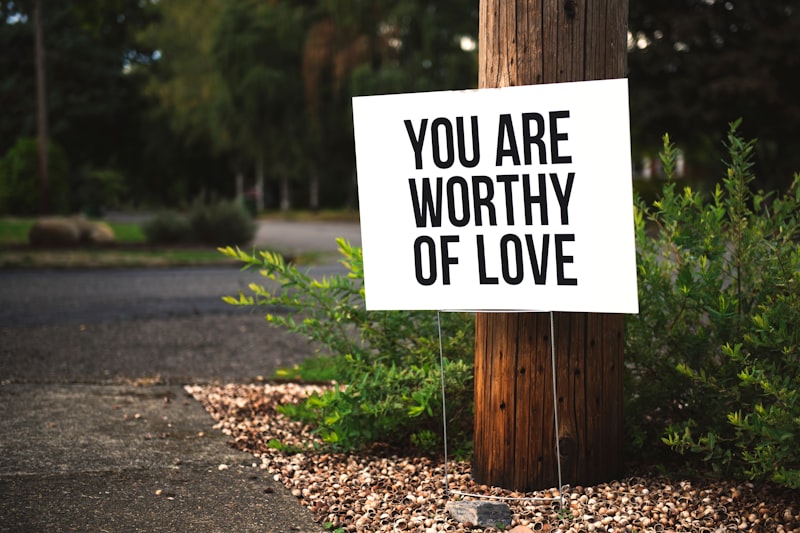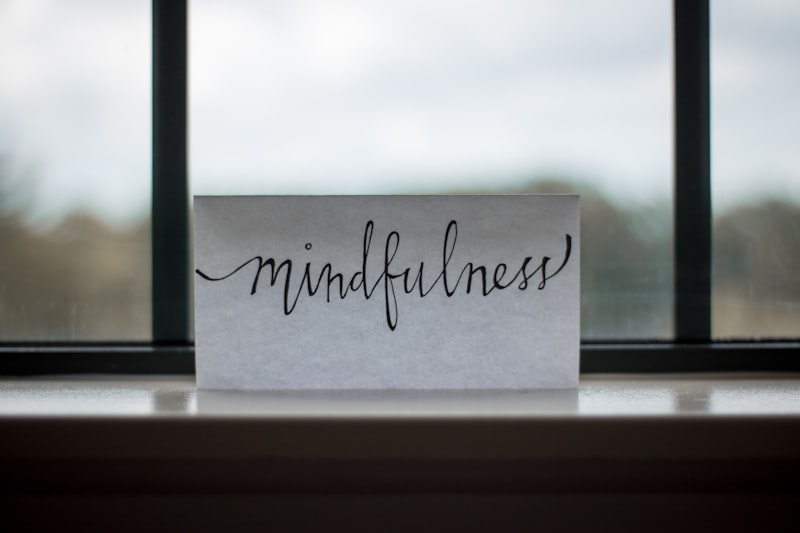One effective method for enhancing self-awareness is mindfulness meditation. This practice involves paying attention to the present moment without judgment. By observing your thoughts and feelings during meditation, you can gain insight into your patterns of thinking and behavior. Over time, this awareness can help you make better decisions and respond more effectively to challenges.
Another powerful technique is journaling. Writing down your thoughts, emotions, and experiences allows you to reflect on them more deeply. This process can uncover underlying beliefs or patterns that influence your actions. Regular journaling helps you track your personal growth journey and identify areas where you want to improve.
Seeking feedback from others is also crucial for self-awareness. Trusted friends, mentors, or coaches can offer valuable insights that you might not see yourself. Constructive feedback helps you see blind spots and understand how your actions impact others, fostering personal growth and stronger relationships.
Engaging in self-reflection exercises is another beneficial practice. Take time regularly to ponder on questions like “What are my core values?” or “What are my long-term goals?” This introspection deepens your understanding of yourself and aligns your actions with your values and aspirations.
Lastly, practicing mindfulness in daily activities can enhance self-awareness. Whether you’re eating, walking, or interacting with others, being present in the moment fosters a deeper connection with yourself and your surroundings.
Mindful Mirror: How Reflection Boosts Self-Awareness
Imagine a mirror that not only shows your outer appearance but also reflects your inner self – your thoughts, feelings, and motivations. That’s what mindful reflection aims to achieve. It’s like polishing a mirror to see yourself more clearly, beyond the surface.
When you take the time to reflect, you engage in a dialogue with yourself. You ask questions like, “How am I feeling today?” or “Why did I react that way?” This introspection brings awareness to your thoughts and emotions, helping you understand yourself better.
Self-awareness, often described as the ability to see yourself objectively, is crucial for personal growth. It’s like having a compass that guides you through life’s ups and downs. By reflecting, you become more in tune with your strengths and weaknesses, your values, and your aspirations.
Think of self-awareness as a skill that can be honed through regular practice. The more you reflect, the more insights you gain about yourself. It’s a journey of self-discovery where each moment of reflection adds a piece to the puzzle of who you are.
Moreover, mindful reflection isn’t just about looking inward; it’s about using those insights to make positive changes in your life. For instance, if you notice a recurring negative pattern in your behavior during reflections, you can actively work towards changing it. It’s like adjusting the sails of a boat to navigate towards your desired destination.
Journaling Journeys: Unveiling the Power of Self-Discovery
Have you ever felt like you’re on a journey of self-discovery but not sure where to begin? Enter journaling – a powerful tool that can guide you through this process. Journaling isn’t just about writing down your thoughts; it’s about embarking on a personal exploration, uncovering layers of your inner self that you may not have been aware of before.

Imagine your mind as a vast landscape, filled with winding paths and hidden treasures. Journaling acts like a compass, helping you navigate through these paths and unearth those treasures – your deepest desires, fears, and aspirations. It’s like having a conversation with yourself, where every page turned reveals a new insight, a clearer perspective.
What makes journaling so impactful is its ability to capture the nuances of your emotions and thoughts. It’s a safe space where you can pour out your heart without judgment or inhibition. Whether you’re celebrating a triumph or grappling with a challenge, journaling allows you to express yourself freely, helping you to understand your reactions and decisions better.
Moreover, journaling is not just a tool for self-expression; it’s also a means of fostering self-awareness and mindfulness. As you jot down your experiences and reflections, you start noticing patterns in your behavior and thoughts. This awareness is crucial for personal growth – it empowers you to make conscious choices aligned with your values and goals.
Think of journaling as a mirror that reflects your inner landscape. It’s not about perfection or literary prowess; it’s about the journey of discovery and growth. Each entry adds a brushstroke to the canvas of your life story, creating a narrative that is uniquely yours.

In essence, journaling is more than a daily ritual; it’s a transformative practice that cultivates clarity, resilience, and authenticity. It invites you to dive deep into the depths of your soul, where profound insights and revelations await. So, grab a pen and paper, or perhaps your favorite digital device, and embark on your journaling journey today. Who knows what you might uncover about yourself along the way?
Emotional GPS: Navigating Inner States for Greater Self-Awareness
Understanding your emotions is like finding the key to a maze where every path leads to a different part of yourself. With an Emotional GPS, you can pinpoint where you are emotionally at any given moment. It’s like having a compass that not only tells you which direction you’re facing but also why you’re feeling the way you are.
Think of it as decoding the signals your mind and body send you. Just like a GPS on a road trip, it helps you anticipate obstacles and make better decisions. When you’re aware of your emotions, you’re better equipped to handle challenges and capitalize on opportunities in your personal journey.

Sometimes, emotions can feel overwhelming or confusing, like trying to navigate in dense fog. An Emotional GPS helps to clear the fog by providing clarity and insights into what drives your feelings. It empowers you to take charge of your emotional landscape rather than being swept away by it.
Self-awareness is the destination on this journey. It’s about understanding not just what you feel, but why you feel it and how it impacts your thoughts and actions. Like exploring uncharted territory, navigating your inner states with an Emotional GPS opens doors to personal growth and deeper connections with others.
So, next time you find yourself caught in a whirlwind of emotions, remember your Emotional GPS. Tune into your feelings, trust your instincts, and let them guide you towards a more authentic understanding of yourself. After all, the greatest journey is the one that leads you back to you.
The Power of Feedback Loops: How Others Shape Our Self-Perception
Imagine this: You’re at work, and your boss praises your recent project. How does that make you feel? Chances are, you’ll feel validated and confident in your abilities. On the other hand, if a colleague criticizes your presentation skills, you might start doubting yourself. These interactions act like mirrors, reflecting back to us a version of ourselves that is partly shaped by others’ perceptions.
Feedback loops are not just limited to professional settings. They permeate every aspect of our lives, from friendships to family dynamics. Think about social media, where likes and comments can boost or deflate our self-esteem in an instant. Each interaction becomes a building block in the construction of our self-image.
What’s intriguing is how feedback loops can create self-fulfilling prophecies. If we constantly receive positive reinforcement, we’re likely to continue behaviors that garner praise. Conversely, repeated negative feedback might lead us to avoid certain situations or doubt our abilities unnecessarily.
Psychologists suggest that our self-concept is not solely based on internal factors but is heavily influenced by external feedback. This concept highlights the interconnectedness between our sense of self and the social environment we navigate daily.
Understanding the power of feedback loops can be empowering. It reminds us that we have the agency to choose whose opinions matter and how much weight we give them. By being mindful of the feedback we receive and actively seeking constructive criticism, we can shape a more accurate and resilient self-perception.
In essence, feedback loops are like a dance between our inner narrative and the external chorus of voices around us. They remind us that while we are individuals with unique qualities, our self-concept is co-created through our interactions with others. So, the next time you receive feedback—positive or negative—pause and reflect on how it might be shaping your self-perception. After all, understanding this dynamic can lead to a deeper understanding of ourselves and our place in the world.
Embodied Wisdom: Using Physical Awareness to Enhance Self-Understanding
Embodied wisdom, simply put, is the idea that our bodies carry valuable insights and knowledge that can enhance our self-understanding. It goes beyond the superficial and dives into the visceral experience of being human. When we talk about physical awareness in this context, we’re talking about tuning in to how our bodies feel and using that information to gain insights into our emotional and mental states.
Think about it this way: Have you ever noticed how tension in your shoulders might coincide with feelings of stress or anxiety? Or how a deep belly breath can instantly bring a sense of calm and clarity? These are not just coincidences but examples of how our bodies communicate with us.
By developing physical awareness, you can learn to decipher these signals more effectively. It’s like learning a new language—except this language is the subtle cues and sensations that your body sends you every moment of every day. When you pay attention to these signals, you’re opening up a whole new world of self-awareness and self-care.
Practicing physical awareness doesn’t require hours of meditation or intense workouts (though those can help too!). It can be as simple as taking a few moments throughout your day to check in with yourself. How does your body feel right now? Are there areas of tension or ease? What emotions might be tied to those sensations?
As you become more attuned to your body, you’ll likely find that you make better decisions, manage stress more effectively, and even deepen your relationships. After all, when you understand yourself better, you can more authentically connect with others.
Frequently Asked Questions
What are some practical exercises to cultivate self-awareness
Discover effective exercises to enhance self-awareness with these practical techniques designed to deepen understanding of your thoughts, emotions, and behaviors.
How can mindfulness practices improve self-awareness
Discover how mindfulness practices enhance self-awareness by cultivating present-moment awareness and fostering a deeper understanding of thoughts, emotions, and behaviors.
How can feedback from others help enhance self-awareness
Learn how feedback from others can boost self-awareness by providing valuable insights into your strengths, weaknesses, and blind spots, helping you develop a more accurate understanding of yourself.
What role does journaling play in developing self-awareness
Discover how journaling enhances self-awareness by encouraging reflection, introspection, and deeper understanding of one’s thoughts, emotions, and experiences.
What is self-awareness and why is it important
Self-awareness refers to understanding one’s thoughts, emotions, and behaviors. It’s crucial because it enhances personal growth, improves relationships, and boosts decision-making skills.


